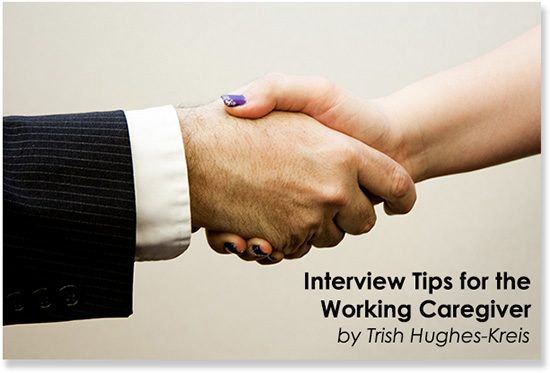Interview Tips for the Working Caregiver

By Trish Hughes Kreis for Assisted Living Directory
Caregivers have terrific skills developed from being organized, determined, tenacious advocates for their loved one. These skills are transferable to the work place which makes caregivers an asset to any employer. Whether the caregiver is currently caring for a loved one or has done so in the past doesn’t make a difference. These skills have been developed and honed, many times for years.

The trick comes in convincing an employer just how valuable these skills will translate to the workplace and how much the employer needs to hire the caregiver. The caregiver may already be a working caregiver and is in need of a different job or they may have been out of the workplace for a while and need to work outside the home again.
The key is in making an outstanding first impression through your resume and during the interview process. As a manager of a mid-size law firm, I am in the unique position of hiring for my firm and also being a working caregiver. I review resumes all the time and frequently interview people for open positions.
I have reviewed resumes that range from organized and well-written to those with poor grammar and misspelled words. I interview people with awesome skills but who blow it in the interview. Sometimes I can overlook the missteps (I have even been known to advise candidates about their resume typos) but many times I just have to move on to the next candidate.
So how can caregivers land a job? Let’s go over a few tips that can help the caregiver during the hiring process.
- Proofread Your Resume. A resume that has typos, misspellings or grammatical errors tells me that this person does not have attention to detail or pride in their work product. Caregivers have to have attention to detail and they certainly take pride in keeping their loved one happy, healthy and comfortable. As an employer, I want to see those same skills and that same attitude.
- Apply for the Right Job. If the open position is listed as full-time, do not apply if you know you can only work part-time. If the position requires experience, do not apply if you are just starting out. Working caregivers do not have a lot of time to waste so do not waste your time applying for a position that does not fit your skills or schedule. The right job will be out there for you!
- Show Up On Time. Arrive timely for the interview. Caregivers show up on time for doctor’s appointments so I know this is possible. I have had candidates call me to say there was a family emergency and they will have to reschedule. This is a perfectly legitimate reason for not arriving timely and calling the potential employer about the delay or need to reschedule shows maturity. Show me you can communicate during the interview process and I will know you will do so as an employee. Bonus tip: do not show up too early for the interview. Ten minutes early is the sweet spot for interviews.
- Be Honest. Whether on the resume or during the interview, honesty truly is the best policy. Do not fudge dates of previous employment or embellish educational achievements. If there is a gap due to caregiving duties then there is a gap in the dates. You do not have to explain the gap but the dates should be included on the resume.
- Share Successes. Please do add to the resume any extracurricular accomplishments, volunteer work or classes (self-study or otherwise). Caregivers are great at taking initiative and can be solid leaders in organizations they are involved with. Please share these successes!
- Leave the Entitled Attitude at the Door. I will understand if you need a flexible schedule (more on that later) but I will think twice about hiring someone who boasts about constantly fighting with their previous employer(s) about their legal rights to time off. I want to hire someone who will work hard for me and then I will definitely work hard for them and I will certainly follow the law (no fighting for legal rights needed).
- Maintain a Positive Attitude. Caregivers have a lot to juggle and oftentimes are solving problems on a daily basis. We have to advocate for our loved one, push doctors and other medical personnel to do what we think is best for our loved one which means we are tough. Toughness does not need to equate to a negative attitude, however. Caregiving is difficult and challenging much of the time (sometimes for long stretches) but working can be that way too. Employers want to know that if there is a rough patch at work that the potential employee will not fall into the grip of negative morale or stop giving their all. Employers want to hire people who are tough, strong-minded, problem-solvers who can get through tough times without falling apart (or worse: becoming part of the problem).
- Special Requests. Save any special requests regarding time off or flexible schedules for our in-person interview. Asking what I can do for you before I have even decided if your skills and education and prior employment fits our needs is premature. Create an inviting cover letter and mistake-free resume so you are invited for an interview. Let’s chat and then we can discuss any special schedule requirements. Not all employers can be flexible with daily schedules but those that can be will be willing to discuss it if the candidate is the right one for the job. I have agreed to flexible schedules for both new hires and long-term employees, many times due to caregiving duties.
Hopefully, these tips will help you, as a caregiver, be hired at a job that you enjoy and that works well with your caregiving life. Wishing you the best of luck in your search!
Photo by Flazingo


